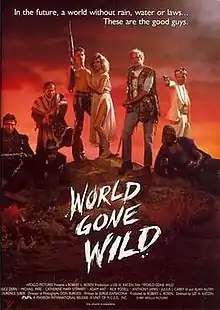World Gone Wild
World Gone Wild is a 1988 science fiction film directed by Lee H. Katzin and starring Bruce Dern, Catherine Mary Stewart and Michael Paré.
| World Gone Wild | |
|---|---|
 | |
| Directed by | Lee H. Katzin |
| Starring | Bruce Dern |
| Music by | Laurence Juber |
| Cinematography | Don Burgess |
Release date | 1988 |
Running time | 95 minutes |
| Country | United States |
| Language | English |
Plot
In the nuclear-ravaged wasteland of Earth in the year 2087, water is as precious as life itself. The isolated town of Lost Wells, an outpost that survived the holocaust, is led by Ethan (Bruce Dern), a Moses-like guru and the last schoolteacher on the planet, Angie (Catherine Stewart). The inhabitants of the town guard the secret of their existence and source of their water from the outside world. The "town" consist of a Mobil station surrounded by a wall of old cars. The school takes place in an old school bus. One of the few books still in existence and held by the town is an unabridged book on etiquette by Emily Post.
An evil cult of pseudoreligious renegades led by Derek (Adam Ant), a group following the teachings in a book on Charles Manson discovers the existence of the water source and wants control of the town's valuable water supply. As the villagers are no match for Derek's brute military force, they hire mercenaries living in a distant city. That group includes Nitro, Ten Watt and they are led by George Landon. The townspeople and the mercenaries team up to stage a last ditch defense of the town. "[1]
Cast
- Bruce Dern as Ethan
- Michael Paré as George Landon
- Catherine Mary Stewart as Angie
- Adam Ant as Derek Abernathy
- Anthony James as Ten Watt
- Rick Podell as Exline
- Julius Carry as Nitro (credited as Julius J. Carry III)
- Alan Autry as Hank
- Mindy McEnnan as Kate
- Bryan J. Thompson as Matthew
- Nancy Parsons as Rape Victim
Reception
The film was nominated for a Young Artist Award in 1989.[2] The movie received 2 out of 5 stars in Creature Feature. The performance of Dern was praised, as was director Lee H. Katzin's work but the source material was found lacking. The movie was found to be a mix of Mad Max and The Magnificent Seven.[3] Similarly, The Washington Post found the script lacking.[4] The New York Times found the movie to be a standard-issue, post-apocalyptic film in the vein of Mad Max, although the attempts at dark humor were appreciated.[5] Similarly, Kim Newman found the movie to stand out over other post-apocalyptic works due to its offbeat humor and its use of western motifs.[6] The LA Times likes the movie, citing the Seven Samurai homage and finding it surprisingly reflective. They likewise appreciated the humor and musical score of the movie.[7]
References
- World Gone Wild Storyline at IMDb
- Awards at IMDb
- Stanley, J. (2000) Creature Feature: 3rd Edition
- https://www.washingtonpost.com/wp-srv/style/longterm/movies/videos/worldgonewildrharrington_a0aa84.htm?noredirect=on
- https://www.nytimes.com/1988/05/22/movies/reviews-film-world-gone-wild.html
- Newman, K. (2000) Apocalypse Movies: End of the World Cinema
- https://www.latimes.com/archives/la-xpm-1988-04-26-ca-1530-story.html